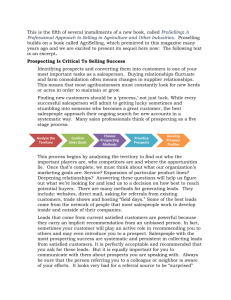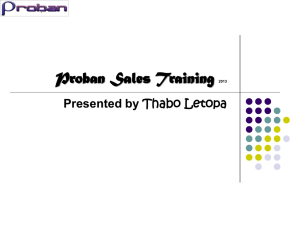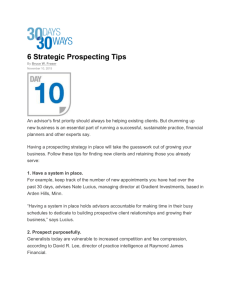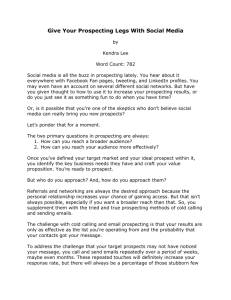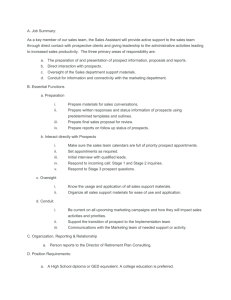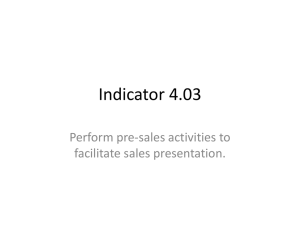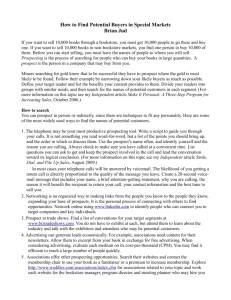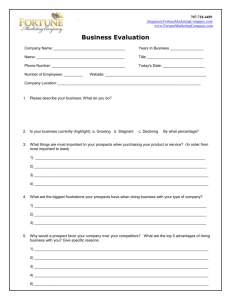CHAPTER 6. PROSPECTING THE LIFEBLOOD OF SELLING
advertisement
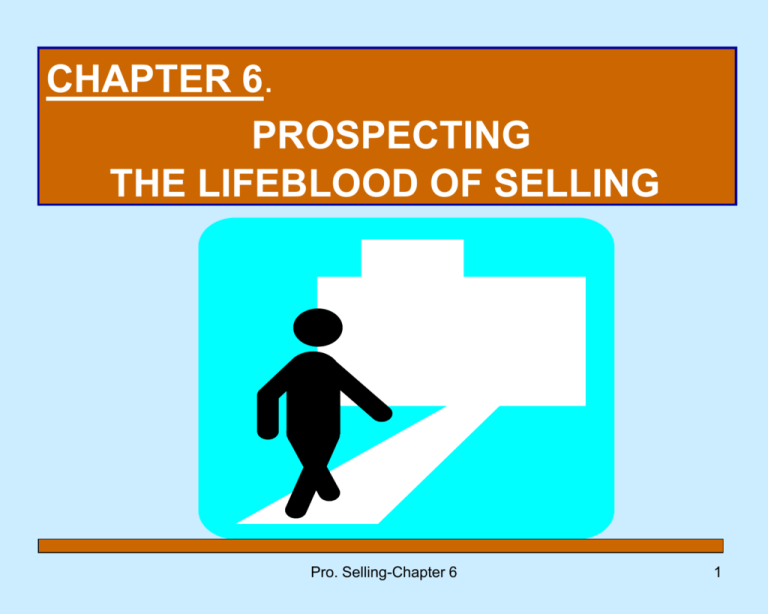
CHAPTER 6. PROSPECTING THE LIFEBLOOD OF SELLING Pro. Selling-Chapter 6 1 Learning Objective After studying this Chapter, you should be able: Define and describe 10 steps in the sales process Explain why prospecting can be considered the lifeblood of selling Defend the importance of prospecting Describe the various method of prospecting Demonstrate how to properly qualify a prospect Describe the importance of referrals to a salesperson’s success Explain the concept of sales funnel Pro. Selling-Chapter 6 2 Main topics The sales process has 10 steps Steps before the sales presentation Prospecting-the lifeblood of selling Prospecting guideline The prospect pool The referral cycle Pro. Selling-Chapter 6 3 A. THE SALES PROCESS HAS 10 STEPS 1. Prospecting 2. Pre-approach 3. Approach 4. Presentation 5. Trial close 6. Determine Objection 7. Meet Objection 8. Trial close 9. Close 10. Follow up Pro. Selling-Chapter 6 4 B. STEPS BEFORE PRESENTATION Prospecting Obtaining an appointment Pre-approach planning A successful salespersons is involved in prospecting; this entails obtaining an appointment with the prospect and planning the sales interview before ever actually meeting with the prospect. Pro. Selling-Chapter 6 5 C. PROSPECTING – THE LIFEBLOOD OF SELLING 1. Why prospect ? - If salespeople did not prospect, they would likely have no one to sell to and hence would make very little money, not to mention be little value to their employer. - Prospecting is the lifeblood of selling. It is necessary to actively prospect for two reasons: + Develop new customers and increase sales + Replace customers that are lost each year Pro. Selling-Chapter 6 6 C. PROSPECTING – THE LIFEBLOOD OF SELLING 2. Not all prospects are created equal Prospecting (identifies potential customers) is the 1st step in selling process. Salespeople are usually able to obtain leads, which are simply the name of individual who may have a need for your product. To be a true a prospect, a lead must be qualified. Qualifying a lead means that salesperson must first determine if a person or an organization has the potential to buy your good or services. To become a qualified prospect, the following must be determined: MAD = MAN Does the prospect have the Money? Does the prospect have the Authority? Does the prospect have the Desire / Need to buy? Pro. Selling-Chapter 6 7 D. HOW TO QUALIFY A PROSPECT The most effective way of qualifying prospects is by simply asking them: Money Authority Desire -How much your budget? -Price range? -Paying cash or financing it? -Are you the main decision maker ? -Buying this product for you or someone else? -Who is decision maker for this purchase? -How urgent you need this product/service. -Replacing an older product -Is your current product not satisfying you anymore Pro. Selling-Chapter 6 8 D. HOW TO QUALIFY A PROSPECT For efficient time management, it is imperative that salespeople subject their leads to the qualification process. - Asking the referral for information - Researching company prospectus - Keeping your industry knowledge up to date (perhaps you may read about a pending expansion of a local company). - Speaking with non-competing salespeople Pro. Selling-Chapter 6 9 D. HOW TO QUALIFY A PROSPECT 1. Motive, means and opportunities : another way of looking at qualifying Salespeople need to find out Why someone would buy something and How could they buy it if they wanted to - Motive - Means - Opportunity Pro. Selling-Chapter 6 10 D. HOW TO QUALIFY A PROSPECT 2. Where to find prospects Sources of prospects can be many and varied or few and similar, depending on services and good sold by the salesperson. Ex: Directories, present customers, newspapers etc. Pro. Selling-Chapter 6 11 C. PROSPECTING – THE LIFEBLOOD OF SELLING EXHIBIT 6-3: Illustrate the important of prospecting Prospecting method that work Source of leads Loss of Customers Cold canvassing Endless chain referral Orphaned customers Sales lead clubs Prospect lists Trade shows Direct response Advertising Website Education seminars Lists and Directories Centre of influence Deaths Poor services Bankruptcy Mergers Relocation Poor economic conditions No longer a need for product Competition takes over New purchasing agent Technology change No more demand Pro. Selling-Chapter 6 12 D. HOW TO QUALIFY A PROSPECT 3. Planning a prospecting strategy - To be successful, prospecting requires a strategy. - Prospecting, like other activities, is a skill that can be constantly improved by a dedicated salesperson. - Finding X number of prospects per week. - Allocating a portion of each working day to finding and contacting new prospects Pro. Selling-Chapter 6 13 D. HOW TO QUALIFY A PROSPECT 4. Prospecting method List and Directories Cold canvassing Endless chain referral Orphaned Customers Sales lead clubs Get list of prospects Become an expert – Get Published Public Exhibitions and Demonstration Centre of Influence Direct mail Telephone and telemarketing Observation Networking Pro. Selling-Chapter 6 14 D. HOW TO QUALIFY A PROSPECT 5. Prospecting guidelines • Customize or choose a prospecting method that fits the specific needs of your individual firm. • Concentrate on high potential customer first, leaving the for later prospects of lower potential. • Always call back on prospects who did not buy (new product may be exactly what they need). Pro. Selling-Chapter 6 15 D. PROSPECTING GUIDELINE EXHIBIT 6-6. THE SALES FUNNEL 250 Prospects 100 cold calls and referrals 25 fully qualified Prospects 15 presentations 4- 6 months 50 Prospects with identified needs 5 Secondary calls 3 Closes Follow up for further business Pro. Selling-Chapter 6 16 E. REFERRALS Referral used in most prospecting methods Referrals can be directly used in: Cold canvassing Endless chain customer referrals Orphaned customers Sales lead clubs Public exhibitions and demonstration Centre of Influence Telephone Networking Pro. Selling-Chapter 6 17 E. REFERRALS A prospect pool is usually created from 04 main sources: 1. Leads – People and organizations you know nothing, or every little. 2. Referrals – You frequently know very little about these people or organizations other than what you learned from the referral. 3. Orphans – Company records provide you only information about these past customers. 4. Your customers –the most important prospects for future sales Pro. Selling-Chapter 6 18 PROSPECT POOL Exhibit 6-7. COMPONENT OF PROSPECT POOL Lead Customer Prospect pool Referral Orphan Pro. Selling-Chapter 6 19 F. REFERRAL CYCLE Exhibit 6-8. THE REFERRAL CYCLE: WHEN TO AKS FOR REFERRALS Preapproach Service & follow -up Prospect pool Presentation Product delivery Pro. Selling-Chapter 6 20 F. THE REFERAL CYCLE Provide guidelines for when a salesperson should ask for referrals 1. The pre-approach 2. The presentation 3. Product delivery 4. Services and follow-up Do not mistreat the referral Tracking referrals Pro. Selling-Chapter 6 21 G. SUMMARY OF MAJOR SELLING ISSUES The sales process involve a series of action beginning with prospecting. The sales presentation is the major element of this process Prospecting involves locating and qualifying the individual and or business that have potential to buy a product. A person or business that may be a prospect is a lead Several of the more popular prospecting methods are: Cold Canvass Endless chain method Public Exhibitions and Demonstration Centre of Influence Direct mail Telephone Observation Pro. Selling-Chapter 6 22 THANK YOU Pro. Selling-Chapter 6 23
